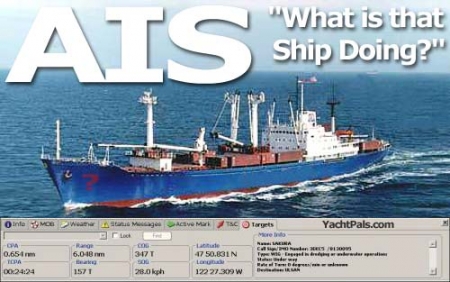As mentioned in an earlier post we’ve been taking classes offered by the Seven Seas Cruising Association‘s university “SSU“. Matt just wrapped up watching the recording of the free session “AIS”.
AIS, which stands for Automatic Identification System, is a standardized navigation safety system originally developed as a collision avoidance tool to enable vessels to electronically “see” each other in all conditions and improve the helmsman’s information about the surrounding environment. For vessels equipped with the system, AIS provides such information as vessel position, course, speed and navigational status (under way, at anchor, etc.), as well as its name and type (sail, power, tug, ferry, etc.).
While Matt already understood the basics of AIS and was planning on including the system in our navigation equipment refit, this class helped him make some final decisions on the right equipment and the right setup.
This course went into much greater detail (differences in AIS class types) but some noteworthy things we took away were:
- Receive/broadcast (Class A) AIS systems aren’t really worth it for small recreational vessels. Receive-only (Class B) is our best solution.
- VHF antenna splitters are not a good solution, it’s best to have a dedicated AIS antenna.
- VHF antennas can not be mounted closer than approx. 3 feet apart.
- And most importantly, no matter how advanced safety equipment is on board, it’s never an excuse to stop following basic safety protocols (like consistently scanning the horizon while sailing and maintaining active watches).
This is a fairly technical subject, if you’d like to know more we recommend further reading at Vesper Marine and GTS Consulting.
(Steven Gloor of GTS taught the SSU AIS class)






Did they make any mention of the new integrated VHF/AIS units such as the Standard Horizon GX2100? I have read that it is designed to work with just the one VHF antenna.
We have yet to take advantage of any of those online workshops. I assume you would recommend them?
Mike
Hi Mike,
They didn’t make any mention of the GX but from my reading on it, one antenna is fine. I am planning on installing the GX, despite DSC, AIS, and VHF being all reliant on one piece of equipment. If it ever goes down it will potentially eventful.
As far as the classes, they have been helpful. They are taught by cruisers so there is always helpful tidbits. Especially some of the more long term cruising applicable ones like “provisioning” and “safety protocols while sailing.”
Matt
Thanks Matt. You probably already read it but if not, there is a very detailed thread on the SSCA forum by a cruiser detailing his experiences with the GX unit. It sounds like it works as advertised. I am trying to talk myself into getting one. :)
Mike